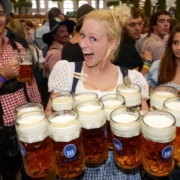10 indispensable dialectal terms if you are in Bavaria
A rich region, cities full of history, gorgeous forests, and beer flowing to rivers. These are just some of the reasons why a visit to Bavaria is a must. As a nice article by The Local recalls, Bavaria is a bit of a world in itself and, as such, it has its own specific language: Bairisch (or Boarisch, in Austro-Bavarian).
Incomprehensible to the profane – even those not fasting from Hochdeutsch, the German standard – Bavarian dialect is an indispensable element to live fully in Munich and the surrounding area. Here, there are newspapers and television broadcasts in Bairisch, which are sometimes hard to understand even for a northern German, and certain terms, at least the basic ones, can be useful for getting in touch with locals more easily. We chose ten of them, just to give you an idea.
Medieval greetings: Grüß Gott and Servus.
The Bavarians have their own way to greet each other. Forget the Hallo and Guten Tags that you learned in school and unlock the religious Grüß Gott, literally «greeting God», but translatable as «good morning» or «hello». Or, if you want some other feudal suggestion, you can use Servus, literally «slave». A greeting formula that can be used even to say goodbye to someone.
Buam and Madln, ladies and gentlemen.
Sometimes you can find these two terms on the toilet door, and if you miss the pictures, you may get confused. So, better to know that Buam is used for men, Madln for ladies.
Dirndl and Lederhosen: the traditional clothes.
You will have seen them a thousand times, at the Oktoberfest or any in any stereotyped representation of Bavaria, but you never remember the precise name. Well, the Dirndl is the typical gown of the Bavarian (and also Austrian) ladies, while the Lederhosen (which, strictly speaking, is not a dialectical term) are the traditional leather pants worn by the young.
Fesch, or “attractive” or even “fresh”
It is the equivalent of the German standard hübsch. You could, for example, hear it in conjunction with Madl in a phrase like Ja mei, was für ein fesches Madl ! : «What a beautiful girl!»
Schmarrn, if someone says nonsense.
The Schmarrn (or Schmarren) is originally a dish (similar to a pancake) but, figuratively, it is also used as a derogatory expression, to mean «nonsense», when someone is saying something unwise or fake .
The equivalent of oder: Gell.
As you may know if you have been living somewhere in Germany, Germans usually used “oder?” or more colloquially, “ne?” at the end of the sentence to stimulate the response of others. It is the equivalent of our «or not?», «is not it?» Even in this case the Bavarians stand out, and their particle for this function is “gell”.
I mog di, or “I like you”.
f you are talking to a Buam or a Madln really fesch and want to declare it, you will need to use these simple words: I mog di, «I like you». It will not be too hard to remember, given the similarity with the Hochdeutsch, Ich mag dich.
When you leave: Pfiat of.
Probably, in your opinion, you will be accustomed to the classic Tschüß or Hello. In Bavaria, they use as usual a formula that has a religious etymology: Pfiat of, which literally meant «God Protect You». Anyways it is a nice way to say hello, right?
Give your consent: freilich.
Those who live in northern Germany, you will be used to give your consent or approval after a question by using terms like natürlich – of course – or selbstverständlich – obviously, of course. In Bavaria you will need to reset on freilich. A bit of patience.
Maß, the Bavarian beer unit.
To what do you think it equates to? One liter, of course. Do not try to get a beer below the Maß, or you might as well not drink at all.
————
Are you getting intrigued by the German language or wish to refine your vocabulary? Then take a look at the German courses that Berlino Schule organizes!






